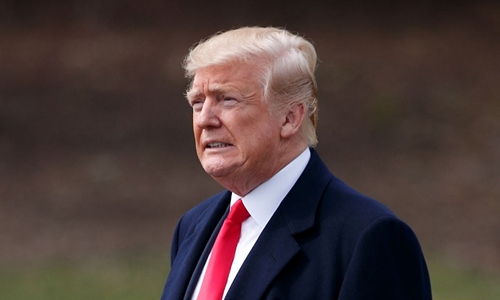
US President Donald Trump. Photo: Xinhua
The creation of the US Space Force as the sixth branch of the US armed forces has caused concerns around the world. US President Donald Trump signed into law in late 2019 the National Defense Authorization Act for Fiscal Year 2020, which approved $40 million for Space Force operations and maintenance. It is estimated that about $13 billion would be spent in the first five years since 2020 to establish the Space Force.
However, to weaponize space is a violation of UN resolutions.
The UN General Assembly set up the Committee on the Peaceful Uses of Outer Space in 1959 to govern the exploration and use of space for the benefit of all humanity. In addition, according to the Outer Space Treaty, which was approved in the General Assembly and entered into force on October 10, 1967, the States Parties to the treaty, including the US, recognized "the common interest of all mankind in the progress of the exploration and use of outer space for peaceful purposes."
The treaty calls on all States Parties to "refrain from placing in orbit around the earth any objects carrying nuclear weapons" and forbids the "establishment of military bases, installations and fortifications."
The creation of the US Space Force and Washington's intention to deploy military forces in space have violated the UN treaties on outer space.
Nonetheless, the US decision wasn't taken on the spur of the moment. Former US president Ronald Reagan initiated on March 23, 1983 the Strategic Defense Initiative, also known as "Star Wars," with the intention to develop a system to destroy incoming missiles.
The US declared its Space Force is designed to defend against other countries' military threats. But its real intention is to seek absolute military advantage in space and hegemony. On June 18, 2018, Trump called for the creation of the Space Force as an armed service separate from the Pentagon's five traditional uniformed branches, despite resistance from the Air Force, which oversaw military space programs at that time, Time magazine reported.
The US Space Force will inject more uncertainty into the world. As US Defense Secretary Mark Esper said, maintaining dominance in space is now the Space Force's mission. Washington not only aims to protect its own satellites, but also wants to strengthen its capability of detecting other countries' moves and launching military strikes from outer space.
This will make outer space more dangerous and inevitably trigger an arms race there, with some countries considering improving their own space security. For example, the Japanese government approved a record draft defense budget for fiscal year 2020 totaling $48.5 billion, strengthening the country's defense capabilities in outer space and cyberspace.
During a summit in London that marked the 70th anniversary of NATO in December 2019, Jens Stoltenberg, the organization's secretary-general, declared "space as the fifth operational domain for NATO, alongside land, air, sea, and cyber."
Therefore, global strategic stability will be severely threatened, with current balance getting upset.
Russian President Vladimir Putin said in early December 2019 that Moscow categorically opposed the militarization of space, but the US moves meant Russia had to further develop its own space sector, Reuters reported. "The situation requires us to pay increased attention to strengthening the orbital group, as well as the rocket and space industry as a whole," Putin was quoted as saying in a CNBC report.
Consequently, outer space would be thus turned into a powder keg, where increasingly more weapons will be placed and threaten all humanity on the Earth.
China is dedicated to peaceful development of outer space and is opposed to its weaponization. Although the US Space Force may need more than 10 years to develop its real combat capabilities, no one should take it lightly but rather be prepared from now.
A close eye must be kept on the US Space Force, especially on the research and development frontier as well as on its combat capabilities.
Against this backdrop, China needs to accelerate the development of its own anti-missile and anti-satellite weapons. Moreover, China must have an effective and detailed strategy to deal with possible threats from outer space in terms of the structure of relevant authorities and measures it can use. Last but not the least, China must be prepared for emergencies so that it is capable of effectively handling other countries' provocations and even military strikes from outer space.
The author is a Chinese expert on missile technology and nuclear strategy. opinion@globaltimes.com.cn
